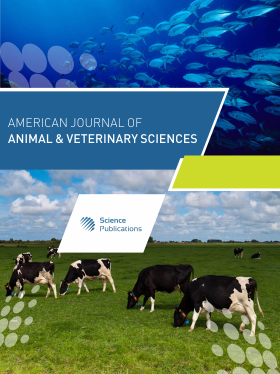EFFECTS OF SUPPLEMENTAL LYSINE ON PERFORMANCE, ANTIBODY TITER AND RECTAL TEMPERATURE IN RESPONSE TO A MODIFIED-LIVE VIRAL VACCINE IN NEONATAL CALVES
- 1 Montana State University, United States
- 2 , United States
Abstract
Infectious Bovine Rhinotracheitis (IBR), caused by bovine herpesvirus-1, contributes significantly to economic losses in the dairy and beef cattle industry. Lysine has been shown reduce virulence of herpesviruses in felids and humans. Our objective was to evaluate the effects of supplemental lysine on serum IBR antibody titer and rectal temperature in response to a modified-live Intranasal (IN) or Intramuscular (IM) respiratory-virus vaccination. Sixty-four neonatal Holstein bull calves (7±2 d of age; BW = 37±4.2 kg) were used in a completely randomized design. Calves were fed milk replacer supplemented with either 17 g/d L-lysine monohydrochloride (LYS; 28 calves) or an equivalent amount of casein (CAS; 28 calves) for 42 d. Calves were then vaccinated with either an IN IBR-Parainfluenza virus-3 (PI3) or an IM (IBR-PI3-bovine viral diarrhea type I and II, bovine respiratory syncytial virus) modified-live vaccine on d 36. A control group (8 calves) received no supplement or vaccination. All calves were housed in individual calf pens (1.2×2.1 m). Daily feed intakes were monitored and BW measured weekly. Calves were bled on d 0, 35, 36, 37 and 42. Temperature data loggers were attached to rectal probes and temperatures were recorded every 5 min from d 28 to d 42. No significant differences were determined for average performance, rectal temperature, or IBR antibody titers with either IN or IM vaccinations between LYS and CAS treated calves (p>0.10). However, serum urea nitrogen and the ratio of serum lysine: Arginine increased (p<0.05) for LYS compared to CAS calves. These results suggest that supplementing lysine impacts nitrogen metabolism but does not alter the response to IBR vaccination or animal performance in neonatal Holstein calves.
DOI: https://doi.org/10.3844/ajavsp.2014.122.127

- 4,129 Views
- 3,446 Downloads
- 1 Citations
Download
Keywords
- Holstein Calves
- Bovine Herpesvirus-1
- Lysine
- Vaccination
